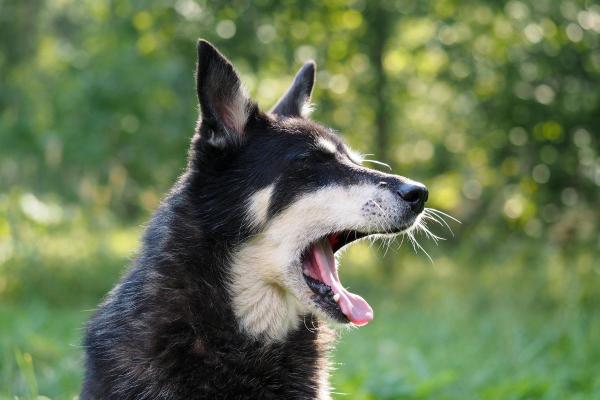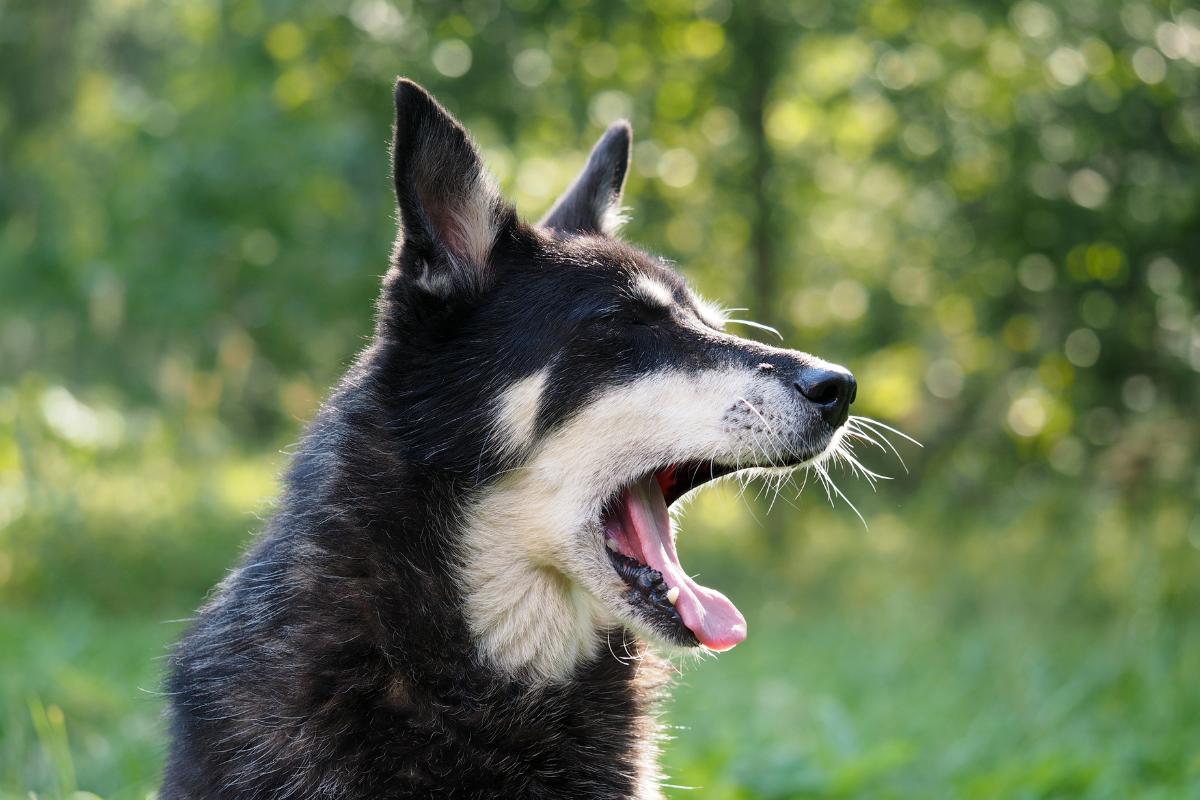Why Do Dogs Yawn?



See files for Dogs
Yawning is a common behavior that we often associate with tiredness or boredom in humans. But have you ever wondered why dogs yawn? Dogs, our loyal and beloved companions, also engage in this intriguing behavior, and it carries significant meaning in their world of communication. Understanding why dogs yawn can provide valuable insights into their emotions, well-being, and the messages they convey.
In this article from AnimalWised, we will explore the fascinating reasons behind dogs' yawning and unravel the various contexts in which they use this behavior.
Why do dogs yawn?
Yawning, a universal behavior observed in humans and various other animals, including dogs, is an intriguing phenomenon.
Yawning involves an involuntary action of opening the mouth wide and taking a deep, prolonged breath. This act allows a larger volume of air to enter the body, improving the oxygenation of the lungs and brain, thereby supporting the optimal functioning of all the cells in our body.
Additionally, yawning stimulates an increase in heart rate, serving as a way to replenish energy. Consequently, we tend to yawn more frequently when we are sleepy or bored and in need of a "wake-up" boost.
Furthermore, recent studies indicate that yawning plays a role in "refreshing" the brain. When we yawn, the maxillary sinus expands and contracts, facilitating the influx of more air into the brain and subsequently reducing its temperature. This suggests that the significance of yawning and its role in maintaining a balance between body and mind in humans may extend beyond what was previously known.
What does it mean when my dog yawns?
Although there are noticeable morphological differences between our species, the act of yawning in dogs closely resembles our own. We can observe our canine companions opening their mouths wide, which may cause their eyes to fully or partially close. Their tongues may protrude out of their mouths and even bend at the tip. Occasionally, dogs may accompany their yawns with a slightly high-pitched sound, although not excessively loud.
However, it's important to recognize that the way dogs yawn can vary depending on the context and the message they are trying to convey. Dogs use a variety of non-verbal communication channels, including gestures, postures, vocalizations, and yawning, to express their mood and interact with others and their environment.
As a result, yawning in dogs is not always an isolated behavior, and we will explore this aspect further in the following section.
If you're curious about why your dog stares at you, you may find this related article intriguing.

Reasons behind your dogs' yawning
Dog yawns are not one-size-fits-all; they can convey different messages depending on the situation and the individual dog. To accurately interpret the meaning behind a dog's yawn, it's crucial to pay close attention to their behavior and consider the context in which the yawn occurs. Let us take a look at all the different reasons your dog might yawn.
Stress or fear
Sometimes, excessive yawning can indicate high anxiety or stress levels in dogs and serves as a way to destress. Stress yawning is often accompanied by cowering, panting, pacing, or hiding. Dogs may experience anxiety in unfamiliar settings like the vet, leading to excessive yawning.
Additional signs of stress, as identified by experts, include the following:
- Pinned back ears
- Exaggerated yawning with a wide mouth and extended tongue
- Pacing
- Trembling
- Drooling
- Heavy panting
- Increased proximity to you
- Changes in posture such as a tucked tail
- Avoidance behaviors, like turning away from you or their toys
- Rapid eye blinking
- Lip licking
- Continuous yawning without breaks
Yawning may occur when dogs feel threatened or uncomfortable due to physical stimuli or emotional reasons. Identifying the cause of your dog's stress can help address their needs effectively.
Confusion or frustration
Does your dog yawn during training sessions? It could indicate either boredom or frustration, and understanding their reactions is key. If your dog struggles with cues or stops training on their own, yawning may signal the need for simpler tasks or more guidance. Adjusting the difficulty level can help them regain interest.
However, if your dog completes tasks easily and becomes mischievous, boredom might be the issue. Look out for signs such as excessive barking, digging, chewing furniture or shoes, or pacing back and forth. These behaviors suggest that your dog requires more stimulation.
Fatigue or tiredness
Sometimes yawing could indicate a lack of sufficient sleep or a decrease in sleep quality. Alongside yawning, there are other physical indications of exhaustion to look out for, such as drooping ears and eyes, heavy panting and a general loss of interest in their surroundings.
If your dog seems fatigued, it's important to assess their sleeping conditions. Do they have a comfortable and quiet place to rest? Furthermore, identifying and addressing any underlying medical issues is crucial, as it can significantly impact their ability to get the necessary rest.
Joy and empathy
Dogs may sometimes exhibit "contagious" yawning, mirroring humans, which could indicate trust, bonding, or empathy.
A dog yawning while resting, playing, or receiving affection is generally a positive sign. A content yawn is slow, with a wide mouth opening and a slight drop of the jaw. It is usually accompanied by silence and brief eye closure.
Yawning can also signal excitement or anticipation for enjoyable activities like walks or playtime. Other signs of a happy dog include lying down with tucked paws, exposing the belly, relaxed ears, tail wagging, and play bowing. While it's hard to prove dogs' love, a relaxed dog yawning and resting comfortably suggests a positive connection.
Should I be worried if my dog yawns a lot?
Yawning in dogs, although a normal and common behavior in many cases, can sometimes indicate underlying issues that require attention. While occasional yawning is generally nothing to worry about, persistent and excessive yawning may be a cause for concern. Here are some factors to consider:
- Uncharacteristic behaviors: if your dog's yawning is accompanied by other unusual behaviors like excessive paw licking, excessive barking, lethargy, loss of appetite, yawning while eating or drinking, or a high frequency of yawning, it may be worth consulting with a vet. These behaviors could be indicators of an underlying medical issue that requires attention.
- Differentiating yawning from fly biting: Fly biting, which involves biting the air as if trying to catch a fly, is a separate behavior that should be distinguished from yawning. Fly biting can be a sign of gastrointestinal or neurological issues. If you observe fly biting or any other unusual behavior, it's advisable to document it with a video and consult your vet for proper evaluation.
- Contextual yawning: If your dog's yawning occurs in specific situations or around certain triggers, such as during visits to the vet or in response to specific stimuli, it may be related to anxiety or stress. In such cases, seeking guidance from a professional, such as a certified dog trainer or animal behaviorist, can help you manage your dog's anxiety and develop strategies to alleviate their stress.
Ultimately, if you have any concerns about your dog's health or behavior, it's always best to consult with a veterinarian. They can evaluate your dog's specific situation, conduct any necessary examinations or tests, and provide expert advice tailored to your dog's individual needs.
If you want to read similar articles to Why Do Dogs Yawn?, we recommend you visit our Facts about the animal kingdom category.






